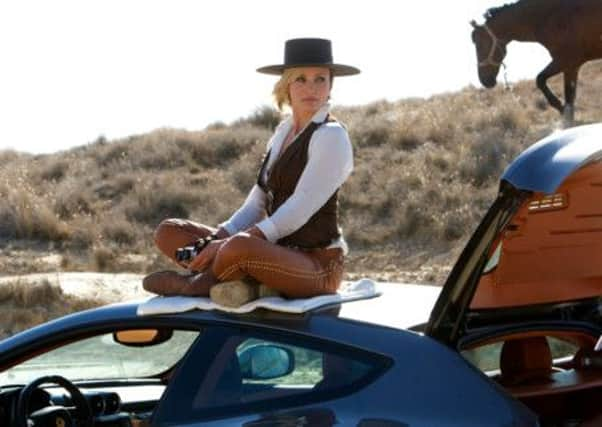Film review: The Counsellor


The Counsellor (15)
* *
Directed by: Ridley Scott Starring: Michael Fassbender, Penélope Cruz, Cameron Diaz, Javier Bardem, Brad Pitt
It’s hard to know where to start with drug smuggling thriller The Counsellor. An epically pretentious piece of pulp from novelist Cormac McCarthy and director Ridley Scott, it’s a film that’s awful in ways that are so outrageously bizarre it’s almost tempting to mount a defence based on the sight of such heavy hitting, above-the-line talent aspiring to make something serious and delivering something silly instead.
Advertisement
Hide AdThat, however, would pre-suppose that there’s some entertainment value to be had wading through The Counsellor’s impenetrable plotting and meaningless monologues.
‘Cast may as well be speaking in code’
Both those things come courtesy of McCarthy, a damn fine writer whose prose provided the Coen brothers with the rock-solid foundations for their astonishing adaptation of his 2005 novel, No Country for Old Men. In his first project written directly for the big screen, he’s taken what is, at heart, a straightforward story about choices, consequences, morality and regret, and transformed it into a verbose treatment on all those things (and capitalism to boot) that makes so little sense on a scene-to-scene basis, its peacocking A-list cast might as well be speaking in code.
That cast certainly delivers some of the least interesting performances of their individual careers. As the titular, in-over-his-head El Paso lawyer, Michael Fassbender is hobbled from the off by an excruciatingly corny sex scene in which he has to talk dirty to the love of his life (played by Penélope Cruz) using religious imagery. Frolicking under crisp white sheets – in a minimalist apartment with curtains that billow in the wind – their passion is pure, but his sin is thinking he can oscillate without any consequences between his life with her and the criminal underworld into which he’s starting to dip his toe.
Crude
With this theme clumsily established, the criminal underworld is just as crudely introduced via the counsellor’s crazy-haired client Reiner (Javier Bardem), a nightclub owner with a pair of pet cheetahs and a hedonistic girlfriend called Malkina (Cameron Diaz).
As characters go, these two wouldn’t look out of place in a mid-period Bond film, particularly when we first see them observing their big cats tearing after some jackrabbits in the desert (Bardem’s appearance in Skyfall seems like the height of naturalism by comparison). Since this isn’t a mid-period Bond film, however, they immediately betray McCarthy’s misconception of cinema as a medium that doesn’t require the same kind of plausibility he accords his novels.
Malkina, in particular, is a deranged creation, but not in a complex, chillingly abstract way like No Country for Old Men’s Anton Chigurh. Instead she’s a depressingly retrograde character whose sexually charged proclivities are there to enhance the old virgin/whore contrast between Cruz’s saintly Laura and her. This is taken to a strange extreme when, apropos of nothing, she gets frisky with a Ferrari, spread-eagling the windshield while a baffled Reiner watches.
‘They seem aware of how bad this is’
Advertisement
Hide AdThat McCarthy and Scott promptly turn the scene into a comment on its own terribleness by having Reiner confess to the counsellor that he’s been scarred by the sight – “It was too gynaecological to be sexy” – does at least suggest they’re aware of how bad some of this is.
Elsewhere, though, it’s clear that they genuinely think they’re creating something profound. When Brad Pitt (reteaming with Scott for the first time since Thelma & Louise) turns up as the shady middleman through whom Fassbender’s lawyer is attempting to arrange a shipment of cocaine from Mexico to Chicago, he repeatedly gives him long speeches about the impersonal, business-oriented nature of the cartels; about the counsellor’s own naivety; and about his own plans for walking out on a life he knows he’s lived for too long.
Advertisement
Hide AdAlas, like all the other speeches in the film – and there are a lot – these are so over-written on the page, they’re dead on arrival on the screen. Consequently it just ends up sounding like cod philosophy delivered by A-listers stumbling around a world that appears to have been conceived as a Tex-Mex version of Miami Vice (the TV show, not Michael Mann’s hard-edged movie).
Of course there are moments where Ridley Scott manages to raise the pulse. But there are also too many inconsequential scenes and extraneous characters to give it any forward momentum. Just keeping track of who everyone is proves a worthless endeavour. At one point, Toby Kebbell shows up as a former client and is never heard from again. Similarly, late on, John Leguizamo and Breaking Bad’s Dean Norris suddenly appear to discuss something relating to body disposal and drug trafficking, but their relevance to the story proves thoroughly mystifying.
It’s a shame because sometimes there’s nothing better than being dropped into a world in which some effort has to be made to tune into the characters. All The Counsellor has to offer, though, is white noise with pretty pictures.